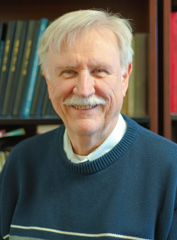Larry DeWerd
Professor
“Go out and move beyond where you’re at. Look at the challenges as opportunities.”
Family?
Three sons, nine grandchildren, all living here in Madison, except for one that’s away to college. We enjoy a very close family, including my mother who is 97.
Favorite book?
That’s a hard one! I generally like Tom Clancy for light reading. I don’t know if I have a favorite of his, but the first one that caught me was “The Hunt for Red October”. I like the intrigue.
What is the accomplishment you are most proud of?
There’s a number of them. The mammography phantom, calibration for mammography beams, developing primary standards in the laboratory.
Hobbies/downtime activities?
I like to read, I like to golf, I like to fish. All the fun things. My wife and I will oftentimes have an evening of movies. We also enjoy visiting national parks and going hiking on the various trails, although not the difficult ones where you go straight up!
In the Spotlight
What is your position in the department? What projects are you working on?
I am a professor in the department, as well as director of the Radiation Calibration Laboratory. I have 15 graduate students who are working on various projects, but the one that’s most exciting lately is that we’re getting an accelerator for use in the laboratory and the department alone. It’s available for students and also for students to “take it apart”, so to speak, so that they don’t have to worry if they break it. I will worry about it, but they don’t have to worry about a patient being treated the next day.
What attracted you to the field of medical physics?
I was always interested in both physics and medicine, and I didn’t like the idea of cutting people, so that’s why I didn’t go into medicine and went into physics. Then I found out when I came here for graduate school, from John Cameron, that I could become a medical physicist and employ both of them together. So John was very instrumental in getting me into the field itself, and I found it very exciting, and still do.
What challenges do you encounter in this field?
The challenges are kind of exciting as well, because of the growth of the field. The field has grown tremendously. It’s come to the point where you need an independent degree in medical physics in order to go on. So the students, when they end up with their degree, it’s very appropriate for medical physics alone. Challenges, we’ll always have challenges, but they’re challenges that need to be solved. Challenges are there to be overcome.
What can students learn from these challenges?
Just know what you know, and find out what you don’t know. Go out and move beyond where you’re at. Look at the challenges as opportunities.
What is the best advice you received?
“Do whatever you can do, do it as well as you can do, but don’t worry about doing it poorly.” It was a quote from John Cameron. It’s better to do it than to not do it.
What is your advice for medical physics students?
Study hard and really put your effort into it. It’s a great field with a lot of rewards. Really be concerned about the patient as the end result. Everything we do, for example in the Calibration Lab, we try to be as precise as we can, so that when you’re as precise as you can be, you’re treating the patient as best as you can.
I have a saying, “We aim for perfection, but we’ll settle for excellence.” Perfection because we’re so precise in our calibrations, but people do make mistakes, so we’ll settle for an excellent result.
What do you think is the future of medical physics?
A great future! We’re getting more and more precise in our calibrations and understanding how to get to the fundamental properties that are involved in calibration. It’s a great future that way, just on the calibration side.
